Best Low-Profile Mechanical Keyboards
What is a low-profile mechanical keyboard?
As the name suggests, low-profile mechanical keyboards have a shorter overall height compared to traditional mechanical keyboards. This is due to a variety of factors. Low-profile mechanical keyboards employ switches with lower actuation points and overall travel distance. In addition, they typically utilize shorter keycaps, further reducing travel distance. Some even employ a thinner chassis, resulting in a more streamlined design that increases portability.
Overall, low-profile mechanical keyboards can be significantly thinner than their standard-size counterparts. However, low-profile mechanical keyboards still retain the feel and durability of a traditional mechanical keyboard.
1. Keychron S1
Price: $130
The Keychron S1 is an ultra-slim keyboard featuring low-profile, hot-swappable Gateron switches. These switches are 48 percent slimmer than standard switches. In addition, the S1 utilizes low-profile double-shot PBT keycaps that resist oil and prevent the legends from fading. The Keychron S1 was designed with Macs in mind. It has all of the Mac function keys you’ve come to expect. Yet, it is fully compatible with Windows-based PCs.
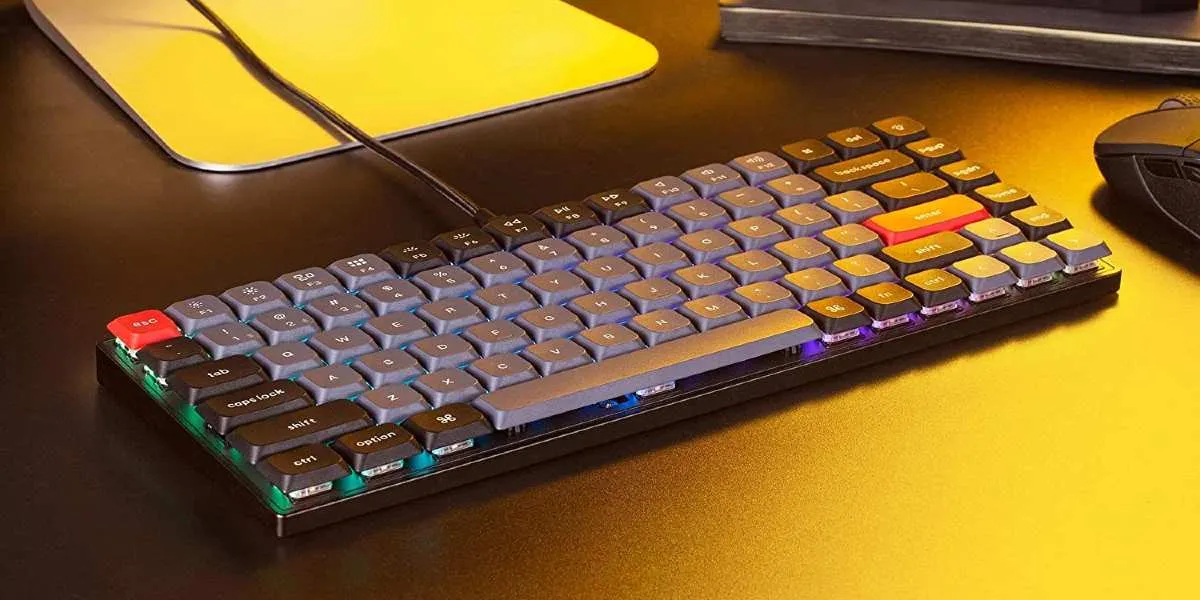
Pros
- Multiple RGB backlight options
- Premium quality
- QMK/VIA support
- Hot-swappable Gateron switches
- Aluminum CNC machined body
Cons
- 75 percent layout may be too cramped for some
- Windows users may be put off by Mac-centric layout
2. Nuphy Air75
Price: $130
The Nuphy Air75 is very similar to the Keychron S1. Both keyboards opt for the 84-key 75 percent form factor and cater to Mac users. But the Nuphy Air75 has both Bluetooth and 2.4 GHz connectivity and a pretty unique color palette.
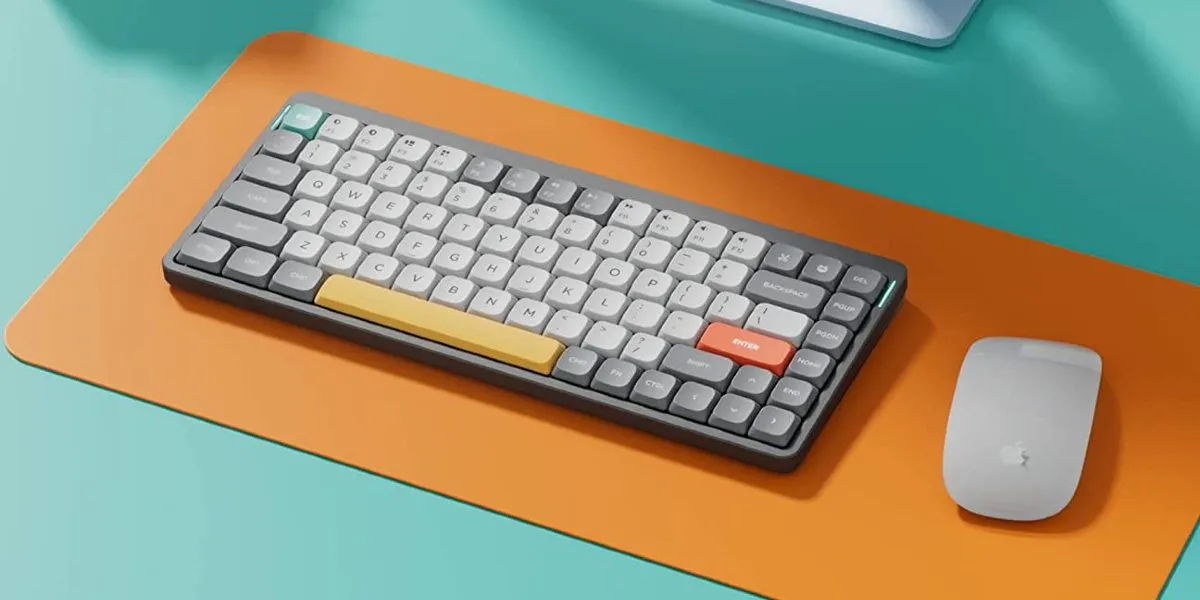
Pros
- Skinny frame
- Wireless via Bluetooth and 2.4 GHz
- Fun colors
- 84-key 75 percent form factor
- Hot-swappable Gateron switches
- Bluetooth connectivity
Cons
- Compatible with Windows but designed for Mac users
3. Redragon K618 Horus
Price: $85
The Redragon K618 Horus isn’t messing around with being low profile. The entire board has been designed to shorten the distance to actuation as much as possible. This includes using proprietary low-profile switches that boast a height of only 12mm and a mere 1.2mm distance to actuation. Compared to the standard mechanical switch with a height of 18mm and 2.0mm distance to actuation, the K618 Horus is pretty impressive. As a gaming keyboard, this can be seen as a competitive advantage due to faster actuation, thanks to the ultra-thin profile.
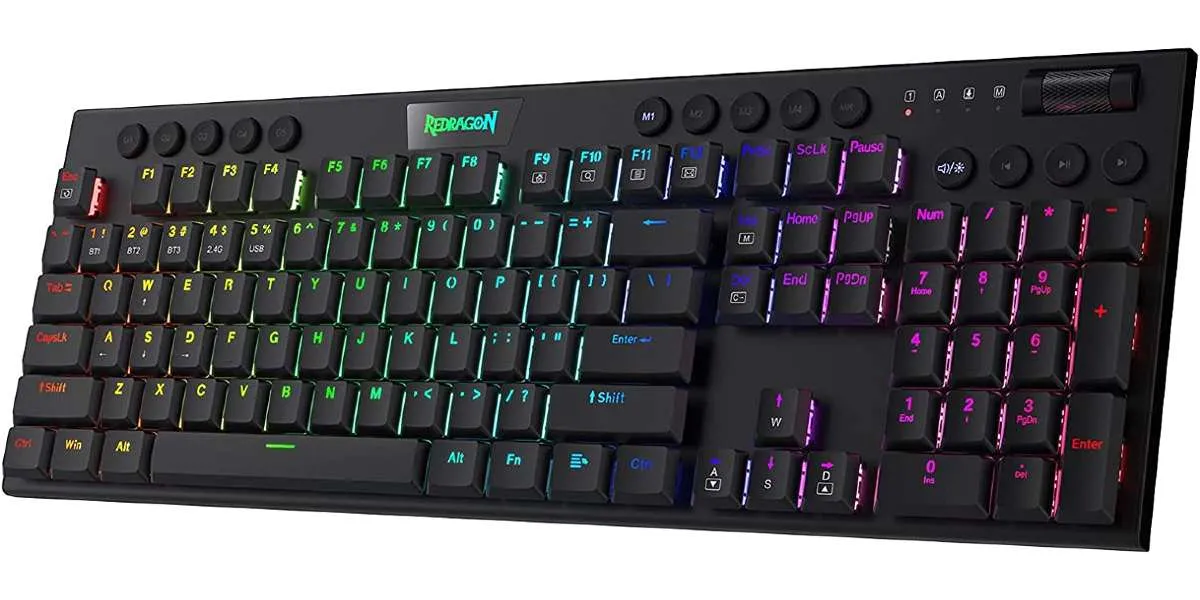
Pros
- 2.4 GHz or Bluetooth wireless or wired connection
- Proprietary ultra-thin switches and keycaps
- 30 percent thinner body
Cons
- Marketed squarely toward the gaming crowd, so RGB lighting may be too ostentatious for everyday users.
4. Corsair K70 RGB MK.2 Low Profile
Price: $175
Look no further than the Corsair K70 if you’re looking for a high-end low-profile gaming keyboard. This setup boasts an aircraft-grade aluminum frame and exclusive low-profile switches that require only 1.0mm of actuation. In addition, the K70 adopts a lower profile frame so that you maintain a more neutral, flat wrist position and avoid discomfort and fatigue.
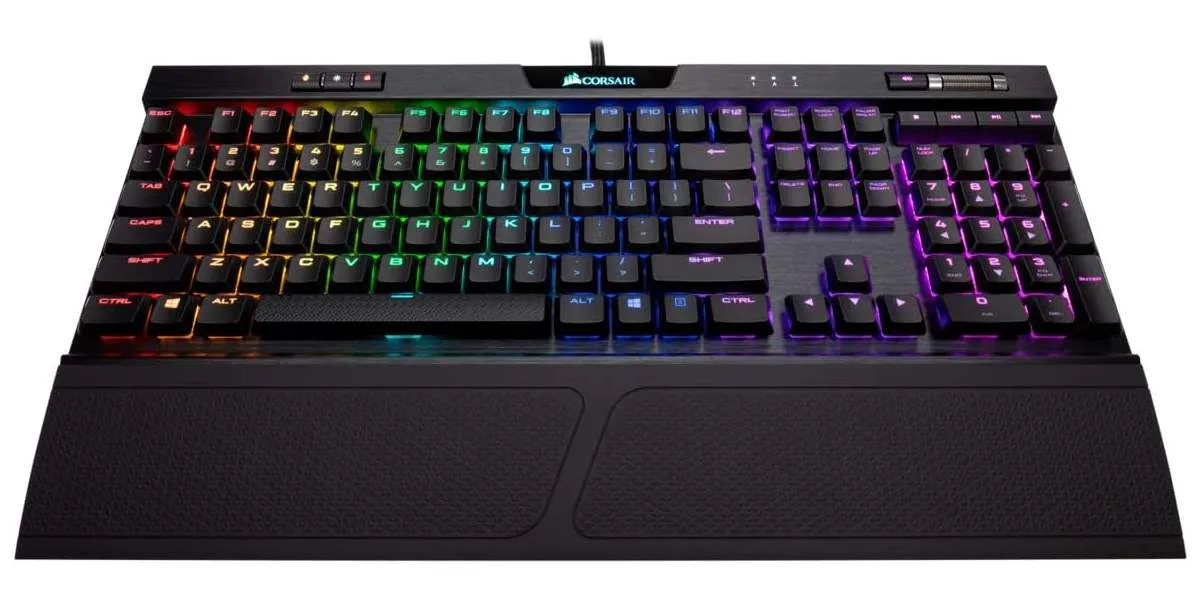
Pros
- Premium metal construction
- iCUE software for easy lighting control and macro programming
- Cherry MX Speed switches
- Low profile frame (only 29mm high)
Cons
- The K70 designation is confusingly used for multiple models, and all are not low profile
- Expensive
5. Cooler Master We622
Price: $68
Do you need to be able to pick up your keyboard and carry it with you? If so, the Cooler Master We622 fits the bill. It is compatible with Windows, macOS, Android, and iOS. This makes it an ideal workhorse keyboard suitable for any situation. You can chuck it in a bag, then use it with almost any operating system. It’s the best option outside of getting a foldable Bluetooth keyboard.
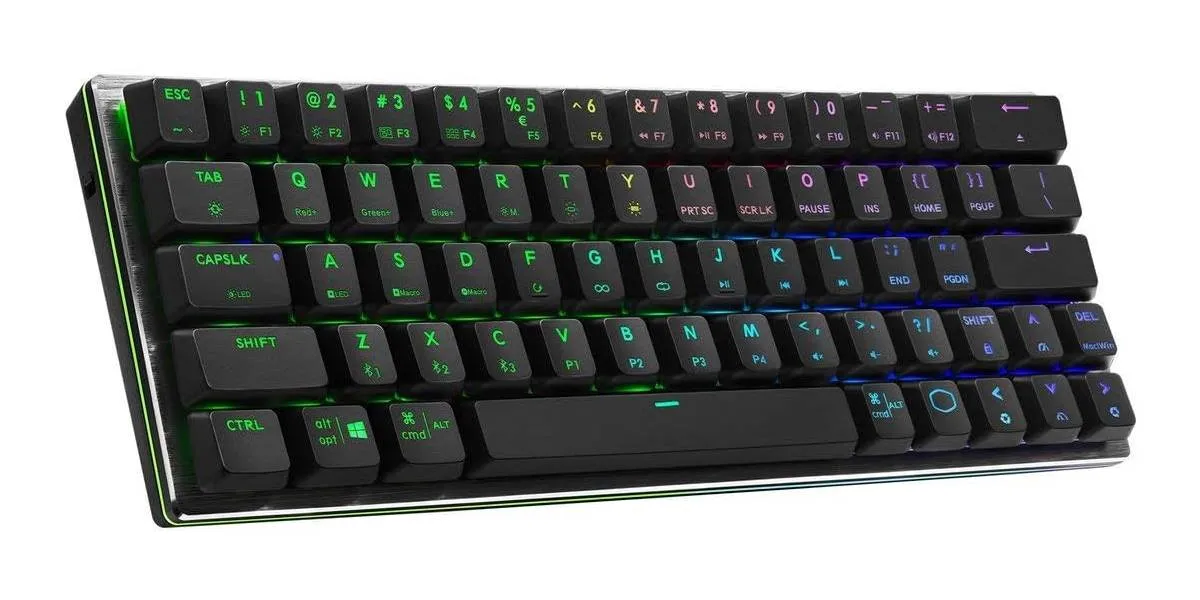
Pros
- 60 percent layout and low profile make it very portable
- Premium brushed aluminum frame
- Wired and wireless with Bluetooth
Cons
- Bluetooth range is lacking
- Small form factor necessitates the use of function keys for specific commands
6. Logitech G815
Price: $170
The Logitech G815 boasts an impressive form factor, measuring a mere 22mm high. In addition, it utilizes Logitech’s proprietary low-profile GL switches and five dedicated G-keys for customized macros. Furthermore, Logitech’s Lightsync technology lets users synchronize the RGB lighting with any content.
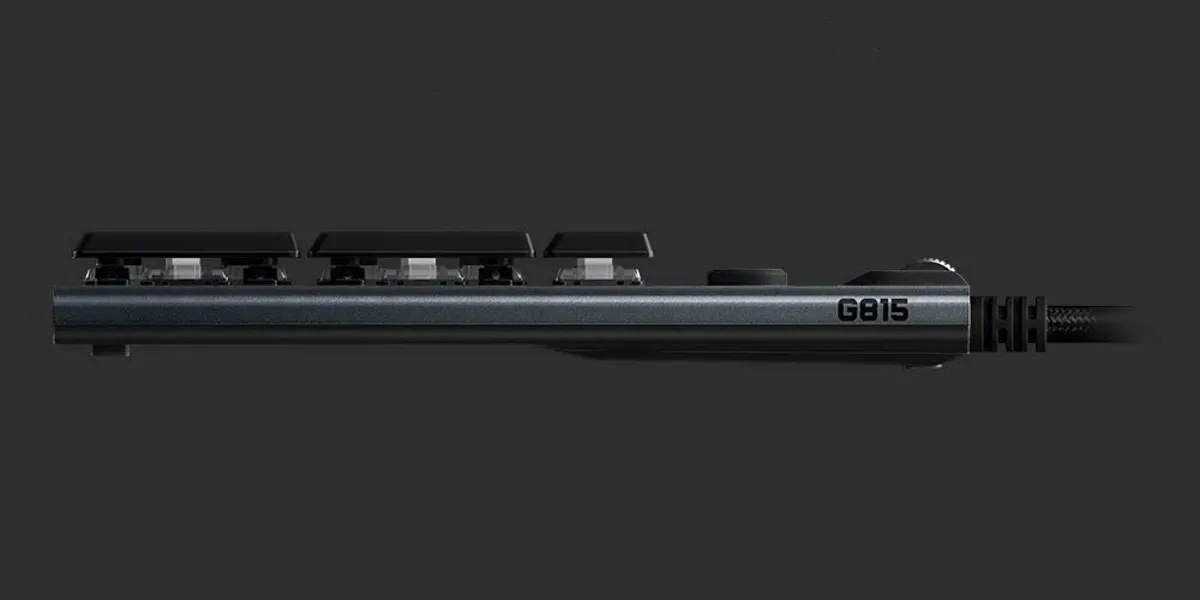
Pros
- Choice of switches
- Lightsync RGB lighting
- USB passthrough
- Five dedicated G-keys for customized macros
Cons
- Some users do not like the feel of Logitech’s GL switches
- Expensive
Also helpful: if you specifically enjoy Logitech products, check out these Logitech keyboard suggestions.
7. Fnatic Streak65
Price: $70
Fnatic is a brand that takes its design cues from professional Esports players. To this end, the Fnatic Streak65 adopts low-profile switches that require only 1.0mm distance to key actuation. This is one of the shortest travel distances on any keyboard. Fnatic asserts that this reduced travel time gives gamers an advantage. Furthermore, since RGB lighting is synonymous with gaming, the Streak65 opts for smaller, thinner keycaps.
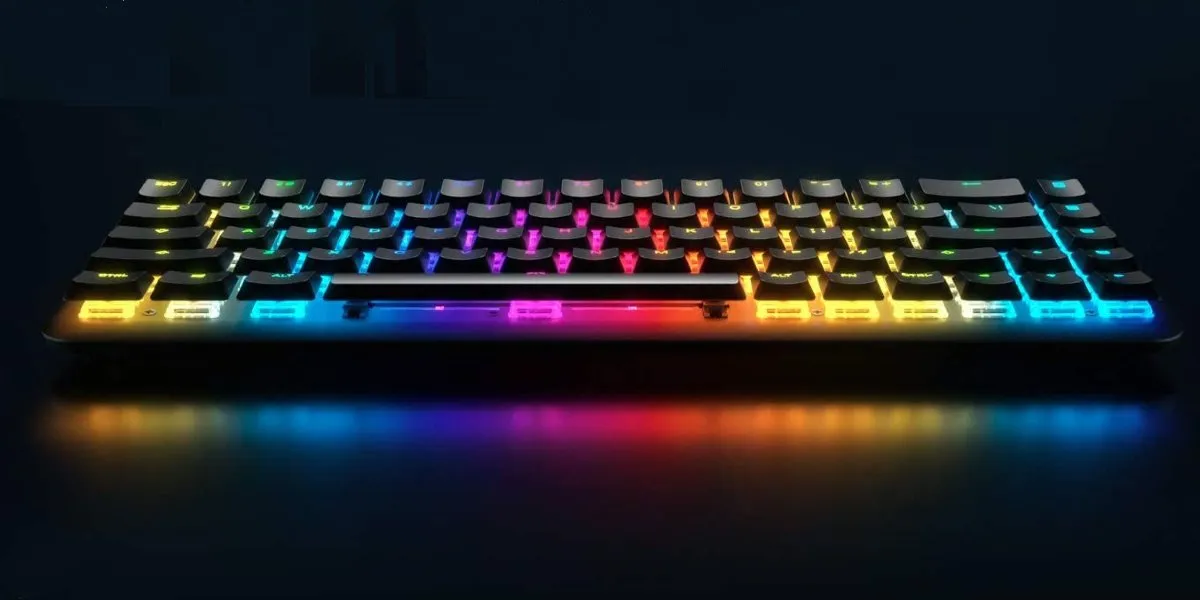
Pros
- Short actuation distance
- Immersive RGB lighting
Cons
- No wireless option
8. Corsair K100 AIR
Price: $230
When you absolutely must have the thinnest keyboard, and money is no object, the Corsair K100 AIR has you covered. Measuring just over 17mm thick, the K100 AIR is thinner than many laptops. With an admittedly expensive price point, the K100 AIR is a premium keyboard with all of the standard bells and whistles you’ve come to expect. However, it also packs Slipstream wireless for a sub-1 millisecond connection, effectively eliminating latency.
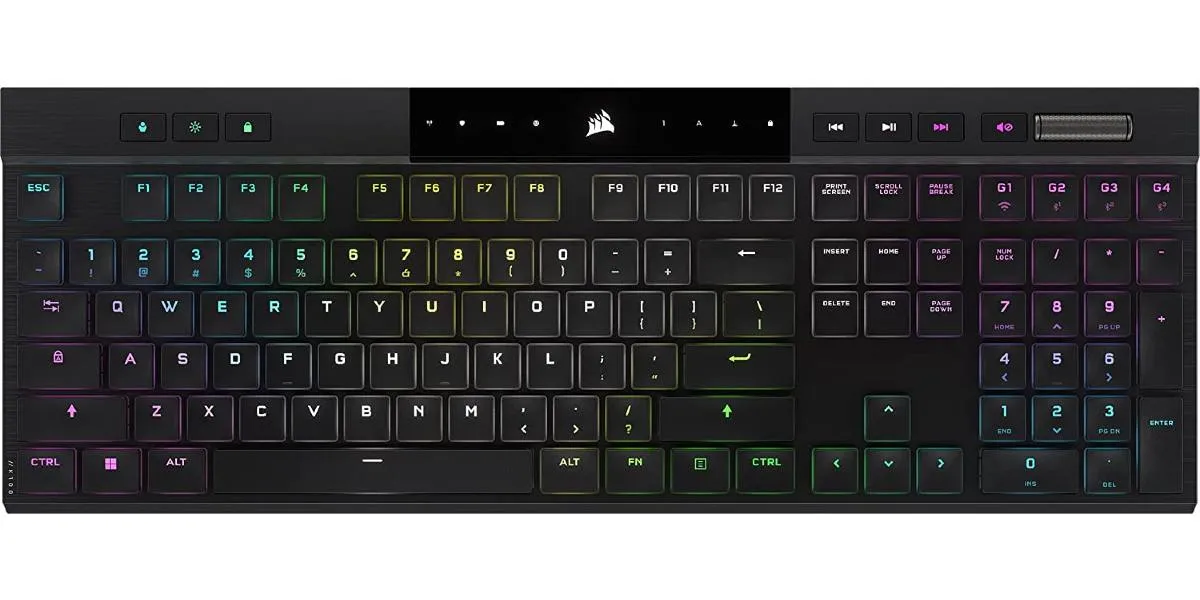
Pros
- One of the thinnest mechanical keyboards in existence
- Slipstream wireless
- Cherry MX switches
Cons
- Very expensive
- Ultra-low profile switches offer a different feel
Frequently Asked Questions
Do low-profile mechanical keyboards come in a variety of sizes and switch options?
Low-profile mechanical keyboards can come in various shapes and sizes, including full-size, tenkeyless, and smaller form factors, such as 60 or 65 percent. In addition, they can also have various switch options, including linear, tactile, and clicky switches, depending on user preference. When considering a low-profile mechanical keyboard, check whether you can select different switch types. If so, select your switch of choice before you hit the checkout button.
How do I know if I’m actually getting a low-profile mechanical keyboard?
It’s no secret that marketing and advertising can be misleading. Unfortunately, the world of mechanical keyboards is not immune to exaggerations. As a result, some keyboards may call themselves low profile but aren’t really. These keyboards usually have a thinner frame but still utilize standard-size switches and keycaps. To avoid being hoodwinked by false marketing, read the fine print. Look closely at the specs and ensure that the keyboard you are considering utilizes low-profile switches and keycaps.
Why are low-profile mechanical keyboards so expensive?
Prices for mechanical keyboards can vary greatly, low profile or otherwise. That said, keyboards of the low-profile variety tend to command more money than their standard-size brethren because of demand. Low-profile mechanical keyboards are very much a niche product. Therefore, because they’re not as popular, they don’t sell as many units, which pushes the price up.
Can I use any keycaps with low-profile switches?
Regardless of whether it defeats the purpose, you cannot use standard keycaps with low-profile switches, as low-profile switches have modified stems that reduce their overall height. If you used a standard keycap, there’s a good chance it would collide with the plate underneath. Therefore, most low-profile switches require low-profile keycaps. With low-profile mechanical keyboards not being as popular as standard-size options, there aren’t as many custom keycap options. Consequently, this can be a deal-breaker for those who like to customize their board.
What are the disadvantages of low-profile mechanical keyboards?
Although low-profile mechanical keyboards offer many benefits, there are some disadvantages.
For example, if you like trying many different switches, you’ll be bummed to know that low-profile switches aren’t nearly as plentiful as traditional switches, as low-profile keyboards aren’t as popular as standard ones.
Also, there’s a shorter distance to actuation, which some folks may dislike because of the overall feel. Granted, this is entirely subjective, but there is a reason there are more standard-size mechanical keyboards on the market compared to low-profile ones.
Image credit: Unsplash
- Tweet
Leave a Reply